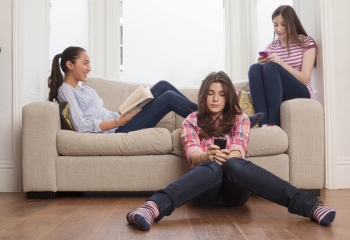It’s chilly outside, but a summer — of sorts — has started in my household this week. My two college students and two high schoolers are home from school for the foreseeable future. There is both excitement about lengthened spring breaks (one high schooler) and real sadness (the others). And there is, of course, a lot of chaos and uncertainty.
My family isn’t alone. Here in the U.S., millions of families are dealing with school closures. The number of students around the world whose education has been interrupted by the coronavirus is approaching 400 million, according to the United Nations Educational, Scientific, and Cultural Organization
As closed schools ramp up for online learning, we can retool in our families, too. Here are three practical ways families can cope — and even thrive — despite school closures, event cancellations, and a whole lot more time at home with the kids.
1. Create some structure around work and school at home now.
I’m supposedly working as I write these words, but my high schooler just popped in to see if I knew where his phone charger is (nope). Before that, one of my daughters came in to get the dog and some stamps. I love seeing my kids and having them home, but each interruption breaks my focus. It takes ages for me to get started again; it’s so much easier to check my email (or the status of the coronavirus) than to do my actual work.
Clearly we need to get set up a little better now, rather than waiting until we know how long this is going to last (it could be a while) or until we are all at our wits’ end (possibly tomorrow). Constant interruptions are a recipe for misery. Not only do they hinder our productivity, but they increase our stress and tension levels in measurable ways.
We can minimize interruptions by carving out specific times and places for each of us to do our work. Our kids need individual work-at-home plans to finish out their semesters. If your kids need supervision and you also need to work from home, find partners (perhaps neighbors if you don’t have a coparent) to help you, and set up shifts so that you are either in charge of the kids or working somewhere that minimizes interruptions — but not trying to do both things at the same time.
2. Connect with your clan.
Earlier this week, I met my brother and his family for dinner, and when I went to hug him, he poked his elbow out like a chicken for an unsatisfying arm bump. “Have you been exposed? Are you feeling ill?” I immediately questioned. No, he was just using an abundance of caution. But exposure within a family is not the same as exposure to 1,000 people at a concert. We were about to share a meal together; if one of us gets the virus, we are all going down anyway, hug or no hug.
Social distancing is painful. We humans need social connection to feel safe. Those of us who live in families have a built-in way to counter the feelings of isolation that social distancing can cause. We can hug our kids and tickle their backs. We can share our meals together — all of them. We can relax and read and watch our shows on the same couch in the same room.
This sort of old-fashioned family time isn’t the norm. These days it seems more natural to eat lunch alone in front of the computer. Kids today are more likely to watch videos on their devices alone than they are to join the family for an episode of TV. But we’ll do well to counter the distancing we’re experiencing from our broader school and work communities by deepening our connections to one another at home. Let’s not be alone together; let’s be together when we’re together.
3. Embrace not being so busy.
Have you recently complained that you can’t find time to exercise? That you’re sleep-deprived? That you don’t have time to cook healthy food? With no athletic events and no commute and no pickups and dropoffs, we parents have a lot more time on our hands.
This is likely to be unsettling at first. We Americans feel important rushing from one commitment to the next. Busyness makes us feel significant. Having more time to take care of ourselves can feel indulgent in a time when sacrifice is called for. But one of the best things that we can do for others is to take care of ourselves. We can better ward off illness when we are mentally and physically healthy, and this puts us in a much better position to help others.
These are strange, uncertain times. But we’ll do well to remember that “life is never made unbearable by circumstances,” as Viktor Frankl wisely wrote, “but only by lack of meaning and purpose.” This may be the longest summer ever — kids may be home for five months! — but let’s not forget to find the meaning behind it.
All of this is about helping others: We are slowing the spread of a lethal and virulent disease, trying to keep our hospitals from becoming overwhelmed, to keep our doctors from having to make decisions about who lives and who dies. We can welcome school closures, and curb complaining about inconveniences.
Stay home, friends. Stay safe. Help others.



